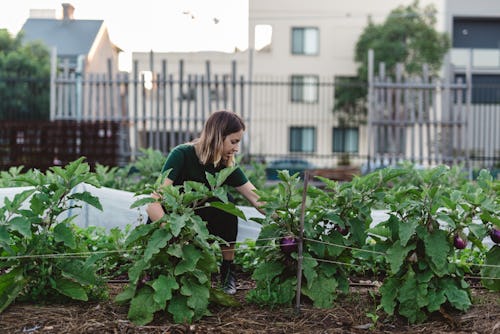This year has thrown some curveballs our way, but it has also required us to pause, think about what we want our future to look like and reset accordingly. For National Recycling Week this year we are looking ahead to our Future Beyond the Bin, where materials remain in circulation and what was once seen as waste is understood as resource. To that end, we are asking Australians from all walks of life to share their inspiring stories of how they #gobeyondthebin at work, home, school and in the community.
Planet Ark: What is Pocket City Farms?
Emma Bowen: We established an urban farm in Camperdown, in Sydney’s Inner West, in 2016. On our 1200 square metre market garden we grow vegetables, herbs and salad greens that we sell direct to the public. We also put a huge focus on our role in the community, providing a place to gather, affordable spaces to hire and many opportunities and events to get involved in, as well as education programs for school students and the wider general community.
What is the environmental philosophy behind Pocket City Farms?
We are aiming to bring more productive green spaces into our cities through developing community-centric urban farm spaces. These not only bring food local to where most of us live, in order to reduce food miles and improve connection, but also improve biodiversity, air quality, and have many great social outcomes. We focus on regenerative agriculture and permaculture principles, aiming to always grow and improve the soil we work upon with the understanding that healthy soil is the essence of all life.

Emma Bowen photographed by Luisa Brimble.
What rules or processes have you introduced to minimise waste on the farm?
Our farm was set up with a good capacity for producing compost on-site, allowing us to direct all waste from the farm there to turn back into food for our next crops. Compost truly is the most wonderful thing! We now have a local community member, Ben, who runs a tight schedule producing compost to both the maximum efficiency and an exceptional standard. Our office space is set up to enable effective recycling and collection of any food waste.
Why is it important for people to purchase food locally?
The choices we make daily through our eating habits can have some of the biggest impacts on our daily personal carbon output. Eating locally not only minimises the distance your food has travelled but increases your connection to the people who have produced it, often leading to a greater understanding of and respect for the process and less waste.

PCF staff composting photographed by Luisa Brimble.
How do you engage with and educate the local community on issues of sustainability?
We work to engage people in as many ways as possible with the farm as a way of introducing them to sustainable and local food production. Two of my favourite ways that we have done this is through the simplicity of our weekly volunteer program, which gets people onto the farm engaged in food growing, as well as our Farm Chats events (currently on hold due to COVID). Our Farm Chats pull together a panel of local experts around a topic, such as ‘Women Who Farm’, ‘Young Farmers’, ‘Food Security’, ‘Soil’, ‘Educating Kids on Food’, and it’s a conversation gathering 100 community members to listen to and join in the discussion on these topics.
Why is reducing food waste important to you personally?
Food waste stats are astounding. Knowing the tremendous effort that goes into growing and producing food, it’s incredible to think that 40 per cent of it then goes to waste. This obviously has its implications not just on the methane-producing end when most of that ends up in landfill creating greenhouse gases, but on the production end, from the costs involved, to the resources used and wasted.

Educational workshop at PCF.
How do you partner with local businesses to reduce food waste?
We work with local businesses (cafes and box suppliers) who buy our produce and who are often fantastic at finding uses for anything that might come out of the farm imperfect. We then also work with some of those businesses to bring their food scraps back to the farm for composting.
What are three simple tings every Australian can start doing tomorrow to reduce food waste?
Upskill in the kitchen. Finding ways to use things you might leave lingering in the fridge or pantry for too long is a good way to ensure it gets used and eaten.
Compost at home with a compost bin or worm farm. If you don’t have space for these, join something like ShareWaste or Positive Waste in your community.
Buy local and get to know where your food is coming from.

National Recycling Week takes place from November 9-13. For more information and to find out how you can get involved, head here.